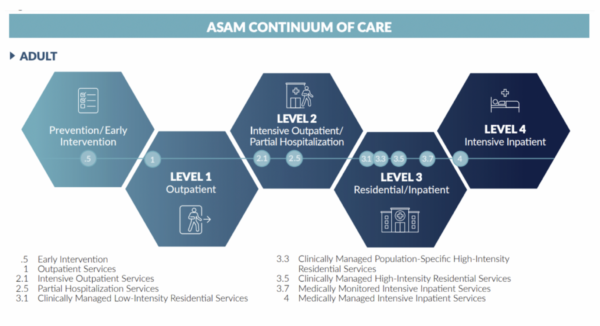
When you or a loved one is struggling with addiction, there is no “quick fix.” When you’re researching the help available, it’s easy to become overwhelmed with the options and the foreign terminology. Rehab, detox, inpatient, outpatient, IOP, partial hospitalization…the list goes on. It doesn’t matter what label you put on the program. You just know that the problem needs to stop and you need help to get there!
At Shanti Recovery and Wellness, we specialize in holistic, evidence-based outpatient addiction treatment. While this level of care is a perfect fit for many patients, it’s not right for everyone. In today’s post, we’ll talk about the different levels of care available to substance use disorder patients in Portland, and we’ll go over the pros and cons of outpatient – sometimes called intensive outpatient or IOP – recovery programs. Finally, we’ll give some guidelines you can follow for deciding if outpatient treatment is a good fit for you or your loved one’s needs.
Disclaimer: The following post is NOT medical advice. Work directly with your physician to determine what type of treatment is best suited to you or your loved one’s situation. If you need help determining if outpatient treatment is a good fit for you, call our office to discuss your situation: (503) 206-8850.
Understanding the different levels of care for addiction treatment in Portland Oregon

According to the American Society of Addiction Medicine, or ASAM, there are 4 levels of care in the continuum of care for substance use disorders.
The first level is called “Prevention.” This is pretty self-explanatory. Preventative care covers everything from educational programming to basic wellness care and pro-social supports to foster a healthy lifestyle that minimizes risk factors for substance use disorder.
“Outpatient” is the next level of care after “Prevention.” Outpatient treatment involves the same treatment planning, medication management, individual counseling and other recovery supports as any other level of care but it is designed to fit into the patient’s pre-existing schedule. Appointments are scheduled around work, family commitments, school or other obligations and can typically be completed while attending work or school full time or close to full time. This level of care is considered to be less “intense” than intensive outpatient care.
The next level of care, “intensive outpatient,” sometimes referred to as “partial hospitalization” is also an outpatient program in nature. The patient continues to live at home or a sober living facility and does not live on-site where treatment occurs. Still, the nature of the program is much more intense than a standard outpatient program. Typically, services are referred to patients three to five days a week, for four to six hours a day. Often, treatment at intensive outpatient programs occurs primarily in a group setting with a cohort of other patients. Intensive outpatient treatment is relatively intrusive on a patient’s lifestyle and oftentimes patients must take time of work, school and other obligations to participate in the program.
“Residential” treatment is the next level of care after intensive outpatient care. Residential is just what it sounds like: a “sleep over” style live-in program where patients reside at the treatment facility 24/7 for the duration of the program. Obviously, residential treatment is very disruptive to the patient’s lifestyle, which can, in fact, be a big draw for patients who want a profound intervention in their established patterns of living.
“Intensive inpatient” is the final level of care. This care is fully medically managed and often takes place in a hospital setting under the direct supervision of doctors and nurses. This level of care is sometimes necessary for those with complex medical detox needs or co-occurring health concerns that require extra medical support.
Pros of Outpatient addiction treatment in Portland Oregon
- Works around your existing schedule
- Supports work/life/recovery balance
- Continue to live at home or in another supportive environment of your choice
- Discrete and confidential
- Works with the demands of parenting and childcare
- Leaves room for other supportive activities, such as spending time with supportive family/friends, pursuing meaningful hobbies, engaging with your faith community, and participating in supportive physical and/or wellness activities
- Much less expensive than residential treatment programs
Cons of Outpatient addiction treatment in Portland Oregon

- Not appropriate for those needing a higher level of care
- Not appropriate for those who do not have supportive living environment
- Creates unstructured time which can be triggering for those with SUD
- Not a good fit for those who need medically supported detox services
- Not ideal for those looking for a tight-knit recovery community/cohort
- Requires reliable transportation (although public transit works! – we’re on several bus lines)
Other blog posts we’ve written about outpatient addiction treatment
4 Things to Look For in Outpatient Addiction Treatment in Portland Oregon
What is Outpatient Addiction Treatment? Why Is It So Popular Right Now in Portland?
What you’ll find at Shanti Recovery and Wellness…
Portland residents tend to gravitate towards our programs because we offer a warm, family-style environment with knowledgeable clinicians in a comfortable setting. Our building is a converted craftsman that looks and feels more like a chiropractor’s office or a naturopathic family medicine clinic than it does an addiction treatment center. We tailor our patient-centered treatment plans around your preferences and goals, taking the whole patient into consideration, rather than treating addiction in isolation.
Interested to learn more about how we can help? Give us a call today to begin your journey to freedom from addiction!
